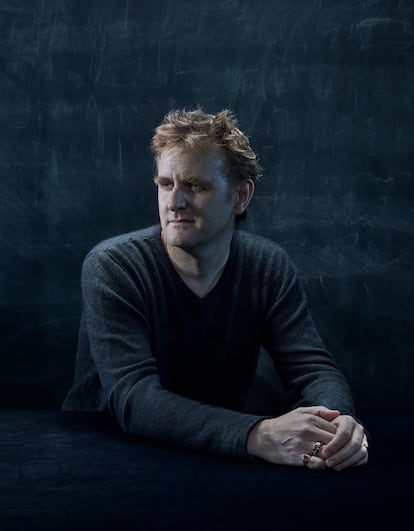An English gentleman who drops by a new town bookstore and befriends his owner to the point of suggesting a community around the classics could be as endearing as it sounds, except - watch out! - in a John novel Carré him.
The old master of spy novels, who died of pneumonia at the age of 89 13 months ago, did not abandon us to our fate but left us sown surprises.
And the most important of them is already coming to light:
Silverview Project
(Planet) is his posthumous work, a true requiem for that British world that has derailed.
The novel keeps keys of his disappointed thinking and a conception of loyalty clinging to principles above any imposition.
Like El Cid, Le Carré will continue to win wars after his death.
More information
A posthumous novel, John le Carré's last mystery
"It is a requiem for the intelligence service as he had described it until then," says his youngest son, Nick Cornwell, by videoconference from London.
“In all his novels there was always someone of integrity like Smiley who did what had to be done, capable of carrying the Holy Grail and taking the world forward in the midst of a catastrophe.
And in this novel there is no one left.
I think my father found that idea very difficult when he wrote it and that is one of the reasons he kept it. "
Nick Cornwell, son of John le Carré.
Three years before he died, David Cornwell, who we all know as John le Carré (1931-2020), commissioned his son Nick to take over his works if anything was left unfinished. There are fragments, there are articles or material that are still under review, but the most complete and coherent thing that he left unpublished was this 2014 novel, kept almost like that luminous Holy Grail that only Smiley could bring to his altar. “He was about to submit it for publication when he finished it and for some reason he parked it. Sometimes he spoke of taking it up again, of working on it more, like any writer. When I went to read it I was afraid it was bad but I found it to be perfect: complete, thoughtful, short like his early works, contained, focused on British hypocrisy and very close to
A Delicate Truth,
which is the perfect distillation of his writing ”, says the son.
The edition has been minimal because, as his son assures, "he ran the marathon and I gave him the final push to cross the finish line."
The result “is a Le Carré classic in every way”.
"So it is a requiem for England?"
—When he wrote it, it wasn't so much a requiem as that music that plays in a movie just before the character dies.
In 2014 there were elections in which the opposite of what was expected happened, then Brexit came and we continue there, in our decline.
It is a book that observes and recognizes the moment when everything begins to go wrong.
The espionage services were for John le Carré a metaphor for British society itself, says his son. And the scent of disappointment that the novel traces from the gaze of that gentleman who frequents the bookstore and who — yes, you have guessed it — is an old spy will be indelible. "The end of truth and integrity in the intelligence service here becomes an indictment of the UK."
The (good) spies of
Project Silverview
have lost faith in their country and in the intelligence service; and the book exudes that usual fight in Le Carré between loyalty to principles, to friends and loves who have given everything, versus loyalty to officials, to the bureaucracy, to cold orders dictated so many times by convenience. politics and dark interests. And that sentiment that Le Carré captured in 2014 in these pages only grew and deepened at the same rate that the United Kingdom opted for Brexit and distance from the world. "The country he believed in," says Nick Cornwell, "was evaporating."
And that doesn't mean he was nostalgic for the Cold War. He hated her for all that was done wrong at the time that she knew how to reflect so well and, on the contrary, he harbored great hopes in the opportunity that opened up at its end: then he aspired and believed possible a future of freedom, safe from totalitarianism and one-sidedness, of great rapprochement with Europe and with solutions for the most vulnerable, describes Cornwell with great emotion in his tone. “All his writing is about compassion, about community. Does that mean you lost faith? I don't know, but the wasted opportunity triggered his anger and made his writing fiercer. " What he was nostalgic about, what he regretted, is that the world did not take advantage of that opportunity. "He always looked to the future, he wanted a better future instead of a better past."
"We have not changed the world," reflects one of the old spies who star in
Project Silverview.
"I think I would have been more useful in a youth club."
And that defeatism concentrated in the microcosm of a small town on the British coast that brings together all the evils of the world, as described by his son, is the flavor that the novel leaves on the palate.
"Did you get the recognition you felt you deserved?"
—I don't think any author in the world believes that they have recognized him as he deserves.
In the Anglo-Saxon world and especially in the United Kingdom he was interpreted as a
thriller
author because he committed the recklessness of selling books.
But he only had to travel and be seen outside to be welcomed as an essential, literary writer, unique to reflect the Cold War and its consequences.
The book is also a book about death. That of Deborah, one of the protagonists, is a foreboding portrait of John le Carré's own wife, who died of cancer just two months after him. But after reflections on the fight, anger and fragility that the disease triggers, the curtain closes, it opens again and the closest thing to immortality arrives. "It is impossible to know if he will be eternal, but while we debate the Cold War, the 20th century and its consequences in the 21st century, we will have to make references to him because he captured that moment in a unique way," says Nick. "His ability to spot stories that eventually make headlines was special, so I conclude that yes: he will be there forever." His great legacy, if Le Carré wanted to be remembered for something, he says, is for compassion.
Cornwell, the fourth son of the author, faced the deaths of his father (in December from pneumonia) and his mother (in February from cancer) in full restrictions due to the pandemic and therefore does not forgive the inhabitant of Downing Street: “Yes, I am one of many who could not do what we would have liked to have done for our parents in their last days, while the Prime Minister was drinking wine in Downing Street.
That is why I am angry with him ”.
The episode of Boris Johnson's parties while the citizens suffered could well be another chapter in a Le Carré book, but we won't see that.
In return, we will read
Project Silverview.














/cloudfront-eu-central-1.images.arcpublishing.com/prisa/IGZ7GOCXZ5GUPAQ2HWGK6Z76BU.jpg)